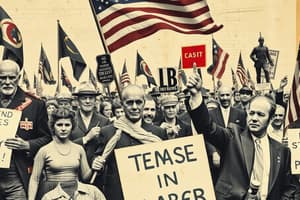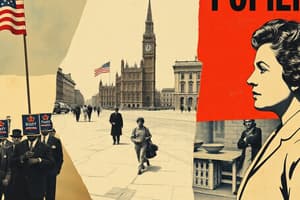Podcast
Questions and Answers
Which issue was central to the Populist Movement's platform?
Which issue was central to the Populist Movement's platform?
- Government deregulation of railroads and utilities.
- Maintaining the gold standard to stabilize currency.
- Implementing bimetallism (free silver) to inflate the money supply. (correct)
- Reducing federal income taxes for all citizens.
How did muckrakers contribute to the Progressive Era?
How did muckrakers contribute to the Progressive Era?
- By exposing social and political corruption through investigative journalism. (correct)
- By suppressing information about unsanitary conditions in factories.
- By advocating for laissez-faire economic policies.
- By lobbying Congress to support big business interests.
Which Progressive Era reform was most directly influenced by Upton Sinclair's The Jungle?
Which Progressive Era reform was most directly influenced by Upton Sinclair's The Jungle?
- The creation of the Federal Reserve System.
- The implementation of child labor laws.
- The passage of the Pure Food and Drug Act and Meat Inspection Act. (correct)
- The establishment of national parks.
What was the primary goal of anti-lynching activists like Ida B. Wells-Barnett?
What was the primary goal of anti-lynching activists like Ida B. Wells-Barnett?
How did Booker T. Washington's approach to racial equality differ from that of W.E.B. Du Bois?
How did Booker T. Washington's approach to racial equality differ from that of W.E.B. Du Bois?
What was a key component of W.E.B. Du Bois's strategy for advancing the rights of African Americans?
What was a key component of W.E.B. Du Bois's strategy for advancing the rights of African Americans?
How did the Populist Party's ideas impact the later Progressive Era?
How did the Populist Party's ideas impact the later Progressive Era?
What role did organizations like the Grange and Farmers' Alliances play in the rise of the Populist Movement?
What role did organizations like the Grange and Farmers' Alliances play in the rise of the Populist Movement?
What was the significance of the Atlanta Compromise, as proposed by Booker T. Washington?
What was the significance of the Atlanta Compromise, as proposed by Booker T. Washington?
How did Jacob Riis contribute to social reform during the Progressive Era?
How did Jacob Riis contribute to social reform during the Progressive Era?
Flashcards
Populist Movement
Populist Movement
A political movement in the late 19th century that represented farmers and laborers
Free Silver
Free Silver
Advocated for bimetallism to increase money supply and inflate crop prices, supported by Populists.
Muckrakers
Muckrakers
Investigative journalists who exposed social and political corruption during the Progressive Era.
"The Jungle"
"The Jungle"
Signup and view all the flashcards
Lynching
Lynching
Signup and view all the flashcards
Ida B. Wells-Barnett
Ida B. Wells-Barnett
Signup and view all the flashcards
Booker T. Washington
Booker T. Washington
Signup and view all the flashcards
Tuskegee Institute
Tuskegee Institute
Signup and view all the flashcards
W.E.B. Du Bois
W.E.B. Du Bois
Signup and view all the flashcards
Double Consciousness
Double Consciousness
Signup and view all the flashcards
Study Notes
- The Populist Movement emerged in the late 19th century
- It primarily represented the interests of farmers and laborers against what they saw as the corrupt elite
- It sought economic and political reforms to address the hardships caused by industrialization and financial systems
- The movement was especially strong in the South and Midwest
Origins
- The movement arose from agrarian unrest due to falling crop prices, high debt, and railroad rates
- Farmers formed organizations like the Grange and Farmers' Alliances to address their grievances
- These groups eventually coalesced into the Populist Party in 1892
Key Issues
- Free Silver: Advocated for bimetallism to increase the money supply and inflate crop prices
- Nationalization: Called for government ownership of railroads and telegraphs to regulate rates and services
- Graduated Income Tax: Supported a progressive tax system to redistribute wealth
- Direct Democracy: Pushed for direct election of senators and the use of initiatives and referendums
Impact
- While the Populist Party faded, many of its ideas were adopted during the Progressive Era
- It demonstrated the potential for grassroots movements to influence national politics
- Some of its reforms such as income tax became law
Muckrakers
- Muckrakers were investigative journalists and writers who exposed social and political corruption in the United States
- They flourished during the Progressive Era (roughly 1900-1915)
- Their work led to significant reforms in various sectors
Role
- Muckrakers aimed to raise public awareness of social ills by publishing their findings in newspapers and magazines
- They focused on issues such as political corruption, corporate malfeasance, and unsafe working conditions
- Their investigative journalism played a crucial role in shaping public opinion and prompting reform
Prominent Muckrakers
- Upton Sinclair: Wrote "The Jungle," exposing unsanitary conditions in the meatpacking industry
- Ida Tarbell: Investigated and exposed the monopolistic practices of Standard Oil in "The History of the Standard Oil Company"
- Lincoln Steffens: Uncovered political corruption in city governments with "The Shame of the Cities"
- Jacob Riis: Documented the living conditions of the urban poor in "How the Other Half Lives," using photojournalism
Impact
- Muckrakers' work led to public outcry and demands for reform
- Their reporting contributed to legislation such as the Pure Food and Drug Act and Meat Inspection Act of 1906
- They prompted reforms in city governments and corporate practices
Anti-Lynching Activism
- Lynching was a pervasive form of racial terror targeting African Americans
- It was particularly prevalent in the South during the late 19th and early 20th centuries
- Activists worked to raise awareness, document incidents, and advocate for federal legislation
Key Figures
- Ida B. Wells-Barnett: A journalist and activist who documented lynchings and challenged the myth of black criminality
- She published detailed reports and traveled extensively to speak out against lynching
- National Association for the Advancement of Colored People (NAACP): It was formed in 1909
- The NAACP made anti-lynching legislation a key part of its agenda
- Walter White: Investigated lynchings and documented the violence perpetrated against African Americans
Strategies
- Investigative Journalism: Activists collected data on lynchings, including names, dates, and details of the incidents
- Public Awareness Campaigns: They used newspapers, pamphlets, and speeches to educate the public about the horrors of lynching
- Legislative Advocacy: They lobbied Congress to pass federal anti-lynching legislation, though these efforts were largely unsuccessful
Impact
- Anti-lynching activism raised awareness of racial violence and injustice
- It laid the groundwork for the Civil Rights Movement
- Though federal legislation failed, activism contributed to a decline in lynchings over time
Booker T. Washington
- He was an educator, author, and influential leader in the African American community
- Washington advocated for vocational education and economic self-reliance for African Americans
- He believed that focusing on practical skills and economic advancement was the best path
Key Ideas
- Industrial Education: He founded Tuskegee Institute in 1881, which focused on teaching practical skills in agriculture, mechanics, and domestic service
- Accommodation: He promoted a strategy of adapting to segregation and discrimination
- He emphasized gradual progress through economic advancement rather than immediate demands for civil rights
- Atlanta Compromise: In his famous 1895 speech, he encouraged African Americans to focus on self-improvement and economic opportunities, while accepting segregation for the time being
Criticism
- Some critics, like W.E.B. Du Bois, argued that Washington's approach perpetuated racial inequality
- They believed that focusing solely on vocational skills ignored the need for political and social equality
- They felt his accommodationist stance accepted segregation rather than challenging it
W.E.B. Du Bois
- He was a scholar, writer, and activist who advocated for full civil rights and intellectual development for African Americans
- He was a co-founder of the NAACP and a leading voice in the fight against racism and discrimination
- He believed that African Americans should have the same educational and political opportunities as whites
Key Ideas
- Talented Tenth: Du Bois argued that a small percentage of educated African Americans should lead the charge for civil rights
- He emphasized the importance of higher education and intellectual pursuits
- The Souls of Black Folk: In his seminal work, he critiqued racial prejudice and explored the concept of double consciousness
- Double Consciousness: He described the internal conflict experienced by African Americans who understand themselves through the lens of a racially biased society
- Activism: He advocated for immediate and direct action to challenge segregation and discrimination
Opposition to Washington
- Du Bois criticized Booker T. Washington's accommodationist approach
- He argued that African Americans should demand full civil rights and equal opportunities rather than accepting segregation
- He emphasized the importance of political activism and intellectual development
Comparison: Washington and Du Bois
- Washington focused on vocational training and economic self-reliance within a segregated society
- Du Bois emphasized higher education, political activism, and the pursuit of civil rights
- They represented different strategies for addressing racial inequality
- They both played significant roles in shaping the discourse on race in the United States
Studying That Suits You
Use AI to generate personalized quizzes and flashcards to suit your learning preferences.




